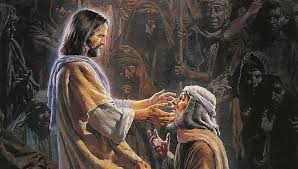This is the video message we posted for our Central church family last night.
The church building might be empty on Sunday, but so is the tomb!
Peace,
Allan
AllanStanglin.com
This is the video message we posted for our Central church family last night.
The church building might be empty on Sunday, but so is the tomb!
Peace,
Allan
 “Who can forgive sins but God alone?” ~Luke 5:21
“Who can forgive sins but God alone?” ~Luke 5:21
There were doubters in that crowded house who watched as four men lowered their paralyzed man on a mat down through the roof into the presence of Jesus. When Jesus forgave the man’s sins, these doubters balked. They double-clutched.
Jesus, knowing what they were thinking, commanded the man to walk and physically healed him right there on the spot. Jesus proves his power to forgive sin when he heals this guy physically. Jesus proves his authority to save the man’s eternal soul when he gives strength to the man’s physical bones. “Get up and walk!” The words and work of Jesus, huh? “Get up and walk!”
The Bible wants us to see that everything God has promised us for the future is already beginning to come true today. The Kingdom has not yet fully come, God’s will is not yet being done on earth just as it is in Heaven. But it has started. In the life, death, and resurrection of Jesus, it has started.
And you are a sign. You’re a foretaste of what God is planning to do with the whole universe. Your life of faith and your discipleship, your prayers and your holiness, your love and your hope, as up and down as it is, are some of the ways God is actually making it happen. When Jesus says to you, “Get up and walk!” he’s calling you to practice hope, to live in hope right now today.
Jesus calls Zacchaeus a beloved son of Abraham and Zacchaeus goes from stealing people’s money to giving his money away. Jesus drives the demons away from the naked guy in the tombs and that guy goes back and tells his whole family how the Lord has changed his life. Jesus had one face-to-face conversation with the woman at the well and she goes from the town sleaze to the town evangelist — she converts her whole village! Jesus forgives Peter and the betrayer becomes the pillar of God’s universal Church.
Christian hope doesn’t mean escaping from the world someday when you die; it means ministering to the world today while you live. Hope is a way of life, right now, that blesses everybody in your world. You have that hope. It’s been given to you by our risen Lord Jesus and you carry it with you everywhere you go. You are a carrier of hope.
“Praise be to the God and Father of our Lord Jesus Christ! In his great mercy he has given us new birth into a living hope through the resurrection of Jesus Christ from the dead, and into an inheritance that can never perish, spoil, or fade — kept in heaven for you, who through faith are shielded by God’s power until the coming of the salvation that is ready to be revealed in the last time. In this you greatly rejoice, though now for a little while you may have had to suffer grief in all kinds of trials. These have come so that your faith… may be proved genuine and may result in praise, glory, and honor when Jesus Christ is revealed. Though you have not seen him, you love him; and even though you do not see him now, you believe in him and are filled with an inexpressible and glorious joy, for you are receiving the goal of your faith, the salvation of your souls.” ~1 Peter 1:3-9
Coronavirus messes everything up. But it cannot touch the inheritance God in Christ is keeping for you in Heaven!
If your future is not secured and guaranteed by God in Christ, then you are going to be overly anxious. You’re either going to be stuck in a paralyzing fear or running blind trying to gain control. You’ll be focused on your own safety and security, your own possessions and lifestyle. And you’ll wind up carrying something besides hope.
It’s anxiety and worry and fear. If that’s what you’re carrying, you’ll infect others with it. And if there’s anything more contagious right now than COVID-19, it’s fear!
Fear is the opposite of faith. And I think it’s OK to be afraid. It’s human nature. It’s going to happen. It’s OK to acknowledge that fear is in the car with you. But you can’t let it drive! It’s in the backseat, where it belongs. Hush! Sit back! Be quiet! You don’t let it drive! If we let our fears and anxieties drive, we’re going to lose our identity, we’ll forget who we are, and who we represent and why we’ve been saved.
We are a people of hope. We’ve been born into a living hope through the resurrection of Jesus and we carry this hope with us always, into every setting and into everything that comes our way. This hope gives us patience. This hope gives us confidence. This hope fuels our perseverance. This hope guarantees us that God is at work in the broken present to bring about our glorious future. This hope allows us to listen without judging, to pray without ceasing, and to love without limits.
Yes, Coronavirus is in the air. Yes, our culture is anxious. Yes, people are afraid. The schools are closed, the economy’s in a nose-dive, I’m on information overload and overkill, and I’m preaching to an empty room in our church building. But I’m telling you, our God is doing something good with all this bad. We know this! We know that God is at work even now in the middle of this mess to bring about what’s best for you and for us, what’s best for his entire creation, and what’s best for his everlasting Kingdom!
“So let us hold unswervingly to the hope we profess, for he who promised is faithful.” ~Hebrews 10:23
Peace,
Allan
Jesus is the Kingdom of God. The Kingdom of God is Jesus. He brings it, he embodies it, he reveals it and shows us what it is. Jesus is the time and the place, he is the where and when God rules graciously in people’s lives. And as subjects in his Kingdom, we are called to be transformed into people who live completely under his lordship. We share his values, his vision, his mission.
But our view of Jesus’ agenda is sometimes obstructed by our own ideas. Centuries of church development and rule-making and decision-making cloud our vision. When we see the Kingdom as Church, we tend to focus only on the features and characteristics of the Church.
Jesus tells the religious leaders they are looking for the Kingdom in the wrong places:
“The Kingdom of God does not come with your careful observation, nor will people say, ‘Here it is’ or ‘There it is,’ because the Kingdom of God is within you.” ~Luke 17:20
The Kingdom of God is an elusive, dynamic, spiritual thing that cannot be confined to any institution. It’s much bigger and much more powerful than that. The Kingdom of God is the person, the activity, the ministry, the power, and the eternal reign of the Lord!
 Our challenge in our churches is to flex our autonomy enough to insure that our identifying characteristics genuinely correspond to those of the Kingdom Jesus is preaching and practicing. Maintaining our institutional status quo is not necessarily the same as being faithful to Jesus and his mission. Being a member in good standing or being a good middle-of-the-road church isn’t necessarily the same as living under the reign of God.
Our challenge in our churches is to flex our autonomy enough to insure that our identifying characteristics genuinely correspond to those of the Kingdom Jesus is preaching and practicing. Maintaining our institutional status quo is not necessarily the same as being faithful to Jesus and his mission. Being a member in good standing or being a good middle-of-the-road church isn’t necessarily the same as living under the reign of God.
The true marks of the Kingdom have very little to do with what happens in between prayers and announcements in your worship center. The Kingdom of God is firmly grounded in and expressed through the weightier matters — those are Jesus’ terms — of justice and mercy and faithfulness. The requirements for us subjects of the King are not keeping the rules as much as acting justly, loving mercy, and walking humbly before God.
The church in Rome was arguing and dividing, complaining and drawing lines in the sand over all kinds of issues: sacred food and sacred days, worship styles and traditions, praise teams and women’s roles, divorce and remarriage, alcohol and dancing, creeds and translations, politics and preachers, song leaders and small groups — they were splitting the church over these things. And Paul says plainly, “Knock it off! Cut it out! The Kingdom of God is not a matter of eating or drinking, but of righteousness, peace, and joy in the Holy Spirit, because anyone who serves Christ in this way is pleasing to God and approved by all people” (Romans 14:17-18).
But what if we’re talking about a “salvation issue?”
Yeah, I can hear it now. We have to be clear on the “salvation issues.” We have to make sure we’re right on the “salvation issues.”
What is a “salvation issue?” Will somebody please tell me what a “salvation issue” is? We get into discussions about salvation issues and we start ranking things in order of importance to God. We argue in terms of what’s going to save us or condemn us. And we’ll vigorously debate baptism and church and the authority of Scripture and worship styles, we’ll argue about church services and church structures and church policies, but we never talk about feeding the poor or loving our enemies. We don’t mention love and grace and forgiveness and mercy. Scripture says those are the weightier matters, those are the salvation issues! Those are the things we’ve got to get straight! That is the Kingdom of God!
 Building schools in Kenya and training preachers in Brazil and housing teenagers in Ukraine — that’s the Kingdom of God. Reading to a 3rd grader at Bivins Elementary and having dinner with a woman from Gratitude House — that’s the Kingdom of God. Serving food at The PARC and praying at Heal the City — that’s the Kingdom of God. Paying water bills for government workers and taking groceries to your grouchy neighbor and talking to the teenager who feels like she doesn’t belong and forgiving you dad and doing all these kinds of things for others in the name and manner of Jesus with the heart of Jesus who fulfills and embodies in every way the eternal blessings and promises of our eternal Father — that’s the Kingdom of God! Where these things prevail, where these things are obvious, that is where and when the Kingdom of God has come and is coming!
Building schools in Kenya and training preachers in Brazil and housing teenagers in Ukraine — that’s the Kingdom of God. Reading to a 3rd grader at Bivins Elementary and having dinner with a woman from Gratitude House — that’s the Kingdom of God. Serving food at The PARC and praying at Heal the City — that’s the Kingdom of God. Paying water bills for government workers and taking groceries to your grouchy neighbor and talking to the teenager who feels like she doesn’t belong and forgiving you dad and doing all these kinds of things for others in the name and manner of Jesus with the heart of Jesus who fulfills and embodies in every way the eternal blessings and promises of our eternal Father — that’s the Kingdom of God! Where these things prevail, where these things are obvious, that is where and when the Kingdom of God has come and is coming!
I long for the day when those are the only things God’s Church is passionate about. Don’t you?
Our King came into this world in order to serve and save. That’s the business of his subjects, too. May our Lord bless us as we love and serve, rescue and save, in his name and for the sake of his Kingdom.
Peace,
Allan
“Kingdom” is not a word we typically use in our everyday American English. When we say the word, it has an other-culture, if not a counter-culture, kind of feel. But “Kingdom” is a very important word for Christians. We use it all the time, mainly in church and church settings.
We’re citizens of the Kingdom. We do Kingdom work. We’re all about Kingdom business. We seek first the Kingdom of God. Sometimes we think the preacher’s going to preach ’til Kingdom come.
We use the word “Kingdom” to talk about things that are Christian as opposed to things of the world. But a lot of people use it to talk about church. Growing up, it seemed the words “Kingdom” and “church” were interchangeable, they were synonyms. Both the “Kingdom” and the “church” — same thing — were established on the Day of Pentecost in Acts 2. I remember hearing several preachers in my youth declare that the Kingdom of God was the church! Some of us were told we should not pray the Lord’s Prayer because the Kingdom had already come — the church! And I remember looking around at my church and the people in it and thinking, “This is it?” No offense, but if this is all there is to the Kingdom of God, then I’d rather not.
 Here’s my definition: The Kingdom of God is the time and place of God’s gracious rule in people’s lives. The Kingdom of God is where and when our God reigns. It’s when and where Christ is Lord and everything wrong is made right and everything that’s broken in you and the people around you is fixed. And it is right here and right now.
Here’s my definition: The Kingdom of God is the time and place of God’s gracious rule in people’s lives. The Kingdom of God is where and when our God reigns. It’s when and where Christ is Lord and everything wrong is made right and everything that’s broken in you and the people around you is fixed. And it is right here and right now.
It has come; praise God. And it is still coming; Lord, come on.
God reigns on his throne in all power over all things right now; Amen. But someday… oh, man… every knee, every tongue, to the glory of God the Father.
The Kingdom of God — all its complexities and fullness, all of its here and now and there and later — is best expressed and experienced and revealed in Jesus. He brought it. He shows us what it is.
Jesus grieved over the heart-breaking, gut-wrenching reality of a world taken over by evil. “Woe to the world,” he says, “because of the things that cause people to sin” (Matthew 18:7). It pained him. He felt strong compassion for this broken world. “How often I have longed to gather your children together, as a hen gathers her chicks under her wings. But you are not willing” (Luke 13:34). It tore at him. It killed him.
Jesus witnesses this broken condition of men and women and he jumps right into the middle of it. God intends to redeem and restore what’s broken. The Father is bent on reconciling all of creation back to himself and he does it through Jesus. Everything Jesus came to do — his birth, life, teachings, ministry, healings, miracles, suffering, death, resurrection — is about fixing our shattered lives, mending ruined relationships, and repairing this broken world.
Jesus, the Son of God, began to work with broken people and he saw the Kingdom of God. He started to sacrifice and serve people and he saw the Kingdom. He saw the major changes that were taking place. He says at the beginning of his ministry, “The Kingdom of God is near!” He saw it. He knew it. That’s what he preached: The Kingdom of God.
In Luke 4, Jesus is healing crowds of people. Laying his hands “on each one, he healed them,” it says. He was driving out demons by the dozens. And then Jesus says, “I must preach the Good News of the Kingdom of God because that is why I was sent” (Luke 4:43).
In Luke 9, Jesus sends his apostles to cast out demons and cure diseases, to “preach the Kingdom of God and to heal the sick” (Luke 9:2). The Bible says they “went from village to village, preaching the Gospel and healing people everywhere” (Luke 9:6). When they came back to report to Jesus all they had done, “He spoke to them about the Kingdom of God and healed those who needed healing” (Luke 9:11).
The Kingdom of God is about healing people. Healing people and the Kingdom of God are joined at the hip. They are inseparable. Eternally connected. The Kingdom of God is healing and fixing and making things right; making things right and fixing and healing people is the Kingdom of God! And it’s happening right here and right now. And it’s a whole lot bigger than church.
Peace,
Allan
“Repent, for the Kingdom of Heaven is near! Produce fruit in keeping with repentance. The ax is already at the root of the trees, and every tree that does not produce good fruit will be cut down and thrown into the fire. I baptize you with water for repentance. But after me will come one who is more powerful than I, whose sandals I am not fit to carry. He will baptize you with the Holy Spirit and with fire. His winnowing fork is in his hand, and he will clear his threshing floor, gathering his wheat into the barn and burning up the chaff with an unquenchable fire.” ~Matthew 3
 I love John the Baptist. I think all preachers love John the Baptist. All preachers want to be as bold and courageous in proclaiming the Gospel. All preachers want to be popular like John the Baptist. We all want to baptize as many people as he did. I think we can all relate to John the Baptist. He didn’t always wear what the people expected him to wear. And when he preached something the people didn’t want to hear, he got his head chopped off.
I love John the Baptist. I think all preachers love John the Baptist. All preachers want to be as bold and courageous in proclaiming the Gospel. All preachers want to be popular like John the Baptist. We all want to baptize as many people as he did. I think we can all relate to John the Baptist. He didn’t always wear what the people expected him to wear. And when he preached something the people didn’t want to hear, he got his head chopped off.
Only once, though. It only happened to him once.
We’re supposed to talk about John the Baptist during the Christmas season. It’s part of Advent. John the Baptist is the one proclaiming that the Christ is coming. But we never include John the Baptist in our Christmas sermons because it just doesn’t fit with the Christmas season. Not the way we like it, anyway. John the Baptist is loud, unpredictable, and rude. He’s like the crazy Uncle John we’d rather not show up for Christmas dinner. He greets the religious leaders in Matthew 3 by calling them a “brood of vipers!” How would you like to get that on the front of a Christmas card?
We want the soft, romantic glow of twinkling Christmas candles and John the Baptist is talking about an unquenchable apocalyptic fire! We want the baby Jesus in a manger, cooing softly at the docile barn animals around him — the Jesus Ricky Bobby is praying to in Talladega Nights — and John the Baptist gives us Jesus as a judge with an ax in one hand a pitchfork in the other!
The prayer of the early church was “Marana tha,” Lord, come quickly. That is not a prayer for Jesus to come again as a helpless infant; it’s the longing cry of God’s people for him to return in the fullness of his power and glory when every knee will bow in heaven and earth and under the earth and every tongue confess that Jesus Christ is Lord to the glory of God the Father! The prayer is for Jesus to come again to finally put an end to all sin and wickedness forever. The hope is that Jesus will make right all the things that are wrong, that he will finally fix everything that’s broken.
That’s not so scary to the poor and oppressed of this world. But, for those of us with a lot to lose? Maybe it’s a little scary.
John the Baptist is proclaiming a reality that’s coming, a reality that’s going to expose what you and I sometimes think is reality. The coming eternal reality is going to show just how false our earthly conditions and our human endeavors really are. The Holy One of Israel is going to expose all our pretensions for what they really are. In him is life and that life is the light of all people. And that light is going to shine in the darkness.
“Wait til the Lord comes. He will bring to light what is hidden in darkness and will expose the motives of people’s hearts.” ~1 Corinthians 4:5
Luke 8 quotes Jesus as saying there is nothing hidden that won’t be disclosed; everything that’s concealed is going to be known and brought out into the open.
“Repent, for the Kingdom of Heaven is near!”
John the Baptist is so completely blown away by the reality of the coming Christ. He sees right through the charades of this world and the roles we play and the lines we say and how precious all this is to us. He sees right through all of it to the sheer power and holiness of the coming Lord. John is pointing us to the future, not the past. He’s orienting us away from our religious rituals and toward the person of Jesus Christ; away from our present-day systems and structures to an utterly brand new authority and dominion of our King and his Kingdom.
It’s happening. John the Baptist is standing out in the desert, hip-high in the waters of the Jordan River, where the world’s resistance to God is meeting the irresistible force of God’s coming. The ax is already at the root of the trees. It’s happening. Get ready. You’d better re-think your priorities, you’d better re-order your lives.
How do we get ready? How do we prepare? Where the do the roads need straightening out? What fires need to be lit to burn away the garbage in his path? What dead trees need to be cut down? What roughness in your heart needs to be smoothed?
~~~~~~~~~~~~~~~~~~~~~~~~~~~~~
It’s amusing to me how “research” and “data” comes out to prove what anybody who’s paying attention already knows. By simple observation — just by looking at the symptoms and the consequences — we all know that smart phones and mobile technology devices are killing us. Socially, mentally, emotionally, academically — it’s hard to find a serious person who believes smart phones make us better. But the research that proves the harmful effects of smart phone technology is just now beginning to come out.
Here’s a link to an article that contains links to some of the more recent studies. Science is telling us that 8-11-year-olds who spend more than two hours on their screens every day are demonstrating “lower cognitive function.” Our mobile devices and social media use share an “unfavorable relationship” with attention, memory, impulse control, and academic performance. Digital technology is proving to slow down the overall development of teenagers. And the smart phones are “stunningly addictive.”
Fascinating!
As the “proof” pours in, elite schools in the U.S. are now beginning to reduce or eliminate the screens in their classrooms. Where once our society feared a technological divide — the rich kids would have access to technology and all the advantages that come with it and the poor kids would not — now scientists and education experts are fearing the opposite. The students in less affluent schools are using the technology and screens and getting dumb while the students in the rich schools are learning without the technology and screens and getting smart.
Shocking!
What emoji do I use to communicate sarcasm?
Peace,
Allan
I love words. I’m in the business of words. I love to write and I love to speak. I believe words are so very important. I think the world of words. But Jesus was not crucified because of his words. His words are not what changed the lives of broken people, his words are not what united fractured groups, his words are not what turned the world upside down. It was his presence. It was the physical things he did in the body. It was the healing and feeding, the forgiving and praying, the eating and sharing — that’s what got him killed. That’s what altered the course of history forever: his flesh-and-blood presence in the world.
Not words. Words are never enough. That’s why the Word became flesh and lived among us. Words are not enough. So Jesus came here and got dirty with us. He has a body, you know.
The things we say in the safety of our sanctuaries aren’t going to change the world. Abstract truth doesn’t stir anybody’s heart. Theological concepts don’t compel faith or love, even when they’re true. But when that truth becomes embodied, when it’s up close and personal, flesh-and-blood truth, cup of cold water truth, that’s when truth gets interesting. That’s when we know for sure the Kingdom of God is near.
In Luke 3, huge crowds of people are coming to be baptized in the Jordan River to prepare the way for the Lord, so all can see God’s salvation. And the folks being baptized ask John: What shall we do?
John answers: If you have two coats, give one of them to somebody who doesn’t have a coat. If you’ve got food, give it to somebody who doesn’t have any.
Tax collectors are coming to be baptized. What shall we do? John says: Stop stealing from people, stop taking advantage of the weak, treat everybody equally.
Some soldiers are being baptized. What should we do? John answers: Stop using force and threat to get your way, stop accusing people and lying about people.
People are being baptized for the forgiveness of their sins, they’re going into the water for a salvation relationship with God, and the instructions they’re given are not about saying the right words or believing the right things or thinking the right way. The instructions are about doing. The expectation is for real, physical, tangible, concrete, flesh-and-blood actions toward the poor and oppressed; how we act toward the outcast and marginalized, the exploited and weak. Not the words we say in the comfort and safety of our buildings, but the actions we take out there. The real, physical, flesh-and-blood actions in the interests of others — all others! Bold, courageous, Christ-like actions that go against the grain of the world and will cost us our reputations, our relationships, and our resources.
We boldly turn the other cheek and go the extra mile. We faithfully love our enemies and pray for those who persecute us so people can see Jesus. We don’t just act on behalf of people who live inside the womb and might be harmed; we courageously act on behalf of all people living outside the womb who might be harmed so people can meet Jesus. We forgive those who sin against us, we lay down our rights for the sake of others, we stand firmly with the oppressed so the world will know the Kingdom of God is here!
The broken world is sick and tired of the Church’s words, words, words! This lost and dying world desperately needs the real, concrete, physical, flesh-and-blood actions of the Body of Christ, the saving and life-giving presence of our Lord Jesus!
This world will not see Jesus, people will not experience the truth of our Savior, just because we love Jesus or because we admire Jesus or because we believe all the right things about Jesus. The world will see it, they’ll know, when we are the Body of Christ. When we follow him, when we give our lives to him, when we do the things he did in the ways he did them for the sake of all others.
Jesus had a body, you know. And he still does.
Peace,
Allan
© 2024 The Kingdom, The Kids, & The Cowboys
Theme by Anders Noren — Up ↑
Recent Comments